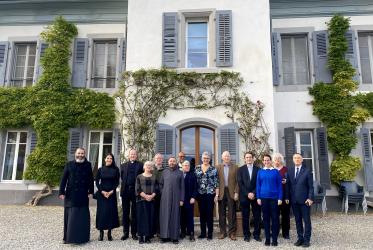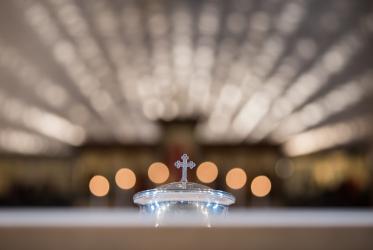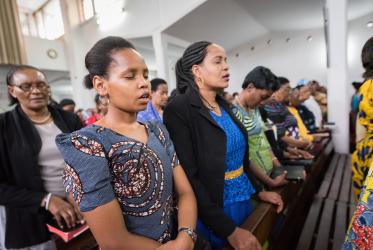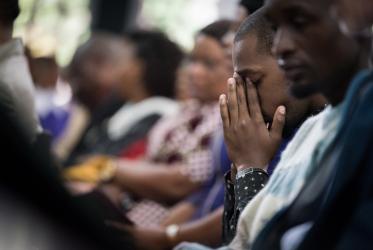World Council of Churches
CENTRAL COMMITTEE
Geneva, Switzerland
26 August - 3 September 2002
Plenary on ecclesiology
Background to the Ecclesiology Study
Prior to the Harare Assembly, the Faith and Order Commission approved for publication, after some five years work, “The Nature and Purpose of the Church : A Stage on the Way to a Common Statement” (Faith and Order Paper no.181). The text sought to state what the churches could say together about the nature of the Church and to identify those areas where disagreement still was evident and where further work was needed if agreement was to be reached. The text was sent widely to churches and appropriate ecumenical instruments for their help in discerning how far they recognised the portrait of the Church presented, and whether they had experience of overcoming some of the unresolved issues. Some 35 substantial responses have been received, from Churches, Councils of Churches, theological colleges and the International Council of Christians and Jews. The responses have been geographically and confessionally unbalanced, and steps have been taken to elicit responses from Orthodox theologians and from appropriate bodies in Asia and Africa to partially redress this. There have been many helpful suggestions, among which the issue of whether a more appropriate title might be “The Nature and Mission of the Church”.
Since 1999, a drafting group has been at work revising the text in the light of the responses and of a series of Consultations where the Commission had perceived that more work needed to be undertaken. Thus, in 2000, a consultation on Ecclesiology and Mission was held with the Mission and Evangelism team (see IRM Vol XV (nos 358 and 359) - 2001); in 2001, a consultation was held on “Does the Church have a Sacramental Nature?”, and in 2002, one on “Authority and Authoritative Teaching”. In the planning for 2003 an investigation on “Ministry and Ordination in the Community of Men and Women in the Church” is anticipated. The results of these events will also affect the revised draft. A number of the responses urged that the text should try to indicate ways in which controverted questions could be overcome or at least placed in a context which was not divisive.
Many of the issues being addressed in the ecclesiology study also reflect other studies in the WCC and on Faith and Order's agenda. The attempt is being made to integrate the insights of these as appropriate. Repeatedly the question of the diversity of the Church and the relation between the local and universal Church is raised either implicitly or explicitly.
The Church - local and universal, diverse and one
The worship celebration at Lausanne, on 25 August, took as its starting point that Christians enter the Church through the Risen Christ, and through baptism in Christ become members of a community which is both local and universal. In each place and time the community seeks to be attentive to the Word of God, allowing the Word to shape its life, inform its understanding, and determine its posture in the society in which it seeks to be faithful. Throughout history, while this basic character of the Church has been retained, different impulses, attempts to articulate the Word of God, and modes of witness have been evident. In many instances, the self-understanding of a specific local community has been subject to the influence of a variety of confessional traditions. Yet, churches in each place, with differing contextual and confessional influences, have affirmed their being in Christ. This was demonstrated in the Lausanne service at the giving of the gift of one of the stones of the Cathedral. “This stone … is a visible reminder of the interrelation of the local church and the church universal; of our being bound together through baptism in Chr ist the cornerstone; of our calling to be living stones through faith, worship and discipleship and of our aspiration to partake together of the supper of our Lord, in whom we are one.”
The church in each place and each time always lives between “the now and the not yet”, always striving to understand and be faithful. Thus the service in the Cathedral of Lausanne ended with the prayer:
Send down upon us your Spirit
- to pray within us that which we dare not pray
- to oblige us to go further than we oblige ourselves
- to restrain us when we are tempted to follow our own ways.
In the Central Committee worship services and Bible Studies the major theme is that of “ecumenical spirituality”. In a recent lecture, Cardinal Kasper noted: “Ecumenical spirituality means listening and opening oneself to the demands of the Spirit who also speaks through different forms of piety; it means a readiness to re-think and to convert but also to bear the otherness of the other, requiring tolerance, patience and respect, and not least good will and love which does not boast but rejoices in the truth (1 Cor. 13:4-6)”. Thus the Bible studies will seek to reflect on the Spirit of diversity and unity, as a basic orientation for the discussion on ecclesiology, baptism and the Asian context; the Spirit as the agent of Christian discernment for the life and witness of the Church as a framework for consideration of the Programme Committee report, and on Racism; and the Spirit, as present in the other, as a prelude to the Report of the Special Commission.
However, the reality of our situation which the ecumenical movement seeks to address, is that because of diversity, contextually and confessionally, there is difficulty in recognising the Church beyond our own boundaries despite frequent, eloquent and passionate calls in a myriad of WCC texts calling us to “live beyond ourselves”. The reports to this meeting of the Central Committee by the Moderator of Central Committee and the General Secretary are but the latest in this series of clarion calls.
In “The Nature and Purpose of the Church” there is therefore an exploration of the Church, local and universal, diverse and one. While the issues which are evident emerge from aspects of the life and work of the WCC in many areas, they have been a central question for Faith and Order. The attempt has been made to explore the relationship between confessions of faith from different parts of the world and the Nicene-Constantinopolitan Creed in the Confessing the One Faith study. The examination of hermeneutics which resulted in the report “A Treasure in Earthen Vessels” (Faith and Order Paper No 182) examined contextuality and catholicity and noted that “diverse contexts inform the selection, as well as the specific interpretation of Scripture”. The Ecumenical Prayer Cycle is an attempt to enable the churches in every part of the world to pray with and for each other thus manifesting the church as both local and universal, diverse and one. The study on Ethnic Identity, National Identity and the Search for Unity raises sharply the issue of a self-understanding of the Church which is exclusive, and where there is difficulty in celebrating being one in Christ with Christians in the same place and in the wider world context, very often as a reaction to a situation of conflict and competition.
The issues of the church local and universal, diverse and one raise the fundamental ecclesiological questions to the self-identity of each church and of the WCC itself.
The Central Committee is therefore invited to help in discerning how in the revised text of “The Nature and Purpose of the Church”, the reality of the Church as local and universal, diverse and one might be celebrated and indicate ways in which churches might move beyond themselves to the recognition of the other and towards unity.
After a brief orientation of the issues by Rev. Dr Hermen Shastri, a member of the Faith and Order drafting group on ecclesiology, you are invited at each table to address the following questions:
- What are the experiences and expressions of the life and witness of other churches which resonate with and enrich your understanding of being and becoming Church and which leads you towards the recognition of the other as Church?
- What are the implications to be drawn from such recognition?
The discussion at tables will last for some 25 minutes.
It would be helpful if towards the end of the discussion you identified one or two points you would wish to share with the Central Committee.
After the table discussion, as many comments as time allows will be elicited from tables (notes of the discussion at each table will be taken and given to those drafting the revised text of “The Nature and Purpose of the Church”).




